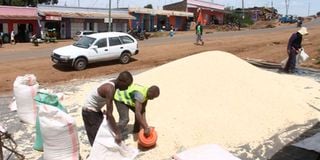Premium
Maize hits Sh5,000 a bag, but farmers not enjoying the boom

Workers dry maize by the roadside in Elburgon, Nakuru County, in January. Decline in supply has pushed up maize prices.
What you need to know:
- Maize traders and large-scale farmers are the ones cashing in on the increase.
- Analysts warn that prices would continue to rise putting more pressure on consumer budgets.
The cost of dry maize has risen to a new high of Sh5,000 per 90kg bag in some parts of the North Rift, with analysts warning that prices would continue to go up putting more strain on family budgets.
Dr Timothy Njagi, a principal researcher at the Tegemeo Institute of Agricultural Policy and Development, says that the price of maize would rise in the next months due to depressed production as well as global uncertainties.
“There are limited stocks currently in the country, which are consistent with the data from the Ministry of Agriculture released few weeks ago,” says Dr Njagi.
He observes that this season has been affected by delayed rains and high cost of inputs such as fuel, seeds and fertiliser, what is expected to push prices up in coming months.
“Last season, farmers bought a 50kg bag of DAP fertiliser at Sh3,000 but this season, it hit Sh6,000. This will have a ripple effect on the cost of maize,” says Dr Njagi.
He notes that since Kenya sources maize from countries like Ukraine and Russia, the ongoing conflict between them requires that the government secures an alternative due to the anticipated depressed production.
“The government should secure deals with other countries. Already, India has signed an agreement with maize producing African countries like Malawi.”
According to the Kenya National Bureau of Statistics, over the last five years, Kenya has imported an average of 295,092 tonnes of maize annually.
But even as maize prices surge from Sh3,600 per 90kg bag months ago, few farmers are reaping from the increase.
A spot check by the Seeds of Gold in the North Rift showed that maize traders and large-scale farmers are the ones cashing in on the increase.
A majority of small farmers who farm on two acres and below, however, are not benefitting having sold their produce months ago for as low as Sh2,000 a bag to purchase farm inputs and for fear that political operatives may flood the market with imports pushing prices down.
Thomas Korgoren, a large-scale maize farmer in Moiben, Uasin Gishu County, is among the few enjoying the good prices.
“The market forces are for the farmer. Schools have opened pushing up demand for the produce,” he said.
Millers are currently buying the produce at between Sh4,100 and Sh4,200 depending on the quality of the grain, observes Korgoren.
Months ago, traders with huge stores descended the North Rift buying the produce from small farmers for as low as Sh2,000 per 90kg bag and stocked them. They are now selling to millers at an average of Sh4,000 and in the retail market at Sh5,000.
“We sold our produce early in preparation for the planting season but the current prices show we should have waited a little,” says Joseph Kwambai, a small-scale farmer in Moiben.
Uasin Gishu Agriculture executive Samuel Yego says large-scale farmers who account for 30 per cent of the market are slowly offloading their stocks. A majority of them have agreements with millers.
“This year, we are projecting lower maize production since farmers failed to get cheaper fertiliser. Some of them were forced to reduce acreage,” he adds.
His Trans Nzoia counterpart Mary Nzomo says the current market favours large-scale farmers, some who are hoarding the produce hoping the price would rise further.
Kipkorir Menjo, a director at the Kenya Farmers Association, says for years, many small farmers dispose of their stocks early to buy inputs and cater for their daily needs thus fail to sell their produce at good prices.
Maize production in 2020 stood at 42.1 million bags, down from 44million in 2019. The country’s maize flour production over the last five years has averaged 2.8 million tonnes annually.





